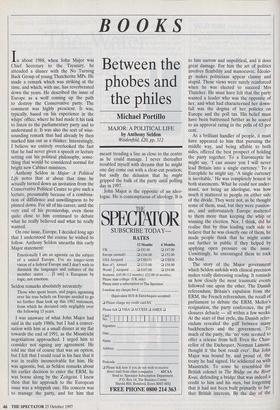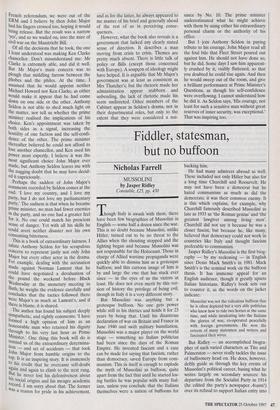BOOKS
Between the phobes and the philes
Michael Portillo
MAJOR: A POLITICAL LIFE by Anthony Seldon Weidenfeld, £20, pp. 512 In about 1988, when John Major was Chief Secretary to the Treasury, he attended a dinner with the No Turning Back Group of young Thatcherite MPs. He made a remark which was striking at the time, and which, with me, has reverberated down the years. He described the issue of Europe as a wolf coming up the path to destroy the Conservative party. The comment was highly prescient. It was, typically, based on his experience in the whips' office, where he had made it his task to listen to the parliamentary party and to understand it. It was also the sort of wise- sounding remark that had already by then marked him out as a thinker. Interestingly, I believe we entirely overlooked the fact that he had never given a speech or lecture setting out his political philosophy, some- thing that would be considered normal for bright new Cabinet ministers.
Anthony Seldon in Major: A Political Life notes that at about that time he actually turned down an invitation from the Conservative Political Centre to give such a lecture, presumably because of a combina- tion of diffidence and unwillingness to be pinned down. For all of his career, until the very end of his premiership, even those quite close to him continued to debate what he really believed and what he really wanted.
On one issue, Europe, I decided long ago that I understood the course he wished to follow. Anthony Seldon unearths this early Major statement:
Emotionally I am an agnostic on the subject of a united Europe. I've no longer-term vision of a federal Europe and I don't wish to diminish the languages and cultures of the member states . . . [I am] a European by logic, not emotion.
Seldon remarks absolutely accurately:
Those who spent hours, and pages, agonising over his true beliefs on Europe needed to go no further than look up this 1982 statement, from which he deviated only negligibly over the following 15 years.
I was unaware of what John Major had said in the early 1980s, but I had a conver- sation with him at a small dinner at my flat towards the end of 1991, as the Maastricht negotiations approached. I urged him to consider not signing any agreement. He told me that of course that was an option, but I felt that I could read in his face that it was in reality inconceivable for him. He was agnostic, but, as Seldon remarks about his earlier decision to enter the ERM, he was borne along by the Zeitgeist. I knew then that his approach to the European issue was a whippish one. His concern was to manage the party, and for him that meant treading a line as close to the centre as he could manage. I never thereafter troubled myself with dreams that he might one day come out with a clear-cut position; but sadly the delusion that he might gripped the bulk of the party until polling day in 1997.
John Major is the opposite of an ideo- logue. He is contemptuous of ideology. It is to him narrow and unpolitical, and it does great damage. For him the art of politics involves flexibility and manoeuvre. Ideolo- gy makes politicians appear clumsy and stupid. Those views were surely reinforced when he was elected to succeed Mrs Thatcher. He must have felt that the party wanted a leader who was the opposite of her, and what had characterised her down- fall was the dogma of her. policies on Europe and the poll tax. His belief must have been buttressed further as he soared to an approval rating in the polls of 63 per cent.
As a brilliant handler of people, it must have appeared to him that pursuing the middle way, and being affable to both sides, offered the best prospect of holding the party together. To a Eurosceptic he might say, 'I can assure you I will never lead Britain into a single currency.' To a Europhile he might say, 'A single currency is inevitable.' He was completely honest in both statements. What he could not under- stand, not being an ideologue, was how much it mattered to people on either side of the divide. They were not, as he thought some of them, mad, but they were passion- ate, and unfortunately Europe mattered to them more than keeping the whip or winning the election. Nor, I think, did he realise that by thus leading each side to believe that he was closetly one of them, he made people think that he might come out further in public if they helped by applying open pressure on the issue. Unwittingly, he encouraged them to rock the boat.
The story of the Major government which Seldon unfolds with clinical precision makes really distressing reading. It reminds us how closely the most traumatic events followed one upon the other. The Danish referendum, Britain's expulsion from the ERM, the French referendum, the recall of parliament to debate the ERM, Mellor's resignation, the party conference, the pit closures debacle — all within a few weeks. At the start of that cycle, the Danish refer- endum revealed the gulf between many backbenchers and the government. To much of the party, the 'no' vote seemed to offer a release from hell. Even the Chan- cellor of the Exchequer, Norman Lamont, thought it 'the best result ever'. But John Major was bound by, and proud of, the treaty he had signed. He soldiered on with Maastricht. To some he resembled the British colonel in The Bridge on the River Kwai, defending a bridge that was indeed a credit to him and his men, but forgetting that it had not been built primarily to fur- ther British interests. By the day of the French referendum, we were out of the ERM and I believe by then John Major had his fingers crossed too, hoping it would bring release. But the result was a narrow `yes', and so we waded on, into the mire of civil war on the Maastricht Bill.
Of all the decisions that he took, the one I least understood was making Ken Clarke chancellor. Don't misunderstand me: Mr Clarke is extremely able, and did it well. But Mr Major's main concern was to plough that middling furrow between the phobes and the philes. At the time, I assumed that he would appoint neither Michael Howard nor Ken Clarke, as either would make it appear that he had come down on one side or the other. Anthony Seldon is not able to shed much light on the matter, nor tell us whether the prime minister realised the implications of his choice. Ken's appointment was taken by both sides as a signal, increasing the hostility of one faction and the self-confi- dence of the other. The prime minister thereafter believed he could not afford to lose another chancellor, and Ken used his Power most expertly. I believe it was the most significant choice John Major ever made, but Anthony Seldon leaves me with the nagging doubt that he may have decid- ed it capriciously. Perhaps the saddest of John Major's comments recorded by Seldon comes at the end: 'I love my country, and I love my party, but I do not love my parliamentary party.' The sadness is that when he became prime minister, no man had fewer enemies to the party, and no one had a greater feel for it. No one could match his prescient sense of danger. Yet with all his skills he Could avert neither disaster nor his own consuming bitterness. This is a book of extraordinary fairness. I salute Anthony Seldon for his scrupulous concern to represent justly not only John Major but every other actor in the drama. For example, dealing with the accusation Made against Norman Lamont that he could have negotiated a devaluation of the pound the weekend before Black Wednesday at the monetary meeting in Bath, he weighs the evidence carefully and concludes that the tactics followed there Were Major's as much as Lamont's, and if there is blame, it is shared. The author has found his subject deeply sympathetic, and rightly comments: 'I have formed a high opinion of him as an honourable man who retained his dignity through to his very last hour as Prime Minister.' One thing this book will do is remind us of the extraordinary determina- tion — and set of accidents — that took John Major from humble origins to the top. It is an inspiring story. It is immensely to his credit that he overcame self-doubt Nam and again to climb to the next rung. his he never lost his defensiveness about Ms social origins and his meagre academic record. I am sorry about that. The former was a reason for pride in his achievement, and as for the latter, he always appeared to me master of his brief and generally ahead of the rest of us in perceiving conse- quences.
However, what the book also reveals is a government that lacked any clearly stated sense of direction. It describes a man moving from crisis to crisis. Themes are pretty much absent. There is little talk of policy or Bills (except those concerned with Europe). A soupcon of ideology might have helped. It is arguable that Mr Major's government was at least as consistent as Mrs Thatcher's; but the rhetoric made her administration appear stubborn and unbending, the lack of rhetoric made his seem undirected. Other members of the Cabinet appear in Seldon's drama, not in their departmental roles, but only to the extent that they were considered a nui- sance by No. 10. The prime minister underestimated what he might achieve with them by using either his extraordinary personal charm or the authority of his office.
But I join Anthony Seldon in paying tribute to his courage. John Major read all the foul bile that Fleet Street poured out against him. He should not have done so, but he did. Some days I saw him apparent- ly crushed by it, visibly flattened, so that you doubted he could rise again. And then he would sweep out of the room, and give a brilliant performance at Prime Minister's Questions, as though his self-confidence were overflowing. I cannot understand how he did it. As Seldon says, 'His courage, not least for such a sensitive man without great reserves of inner security, was exceptional.' That was inspiring too.



















































































 Previous page
Previous page